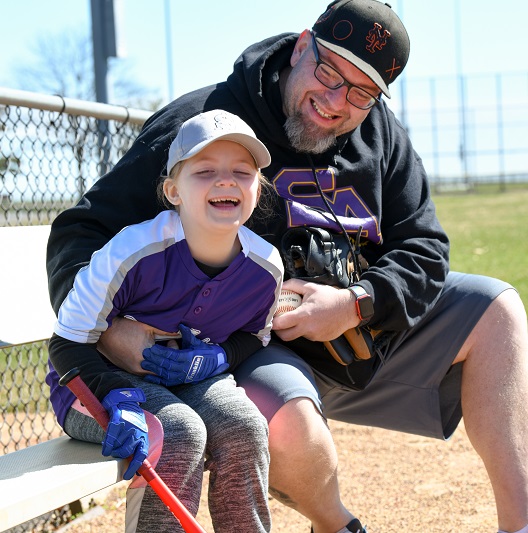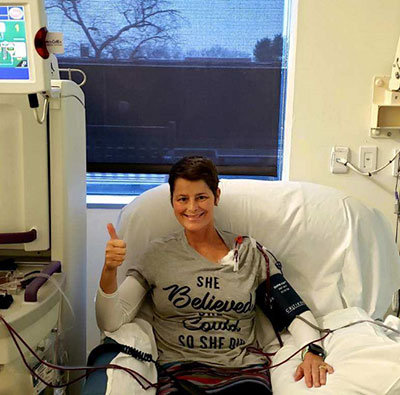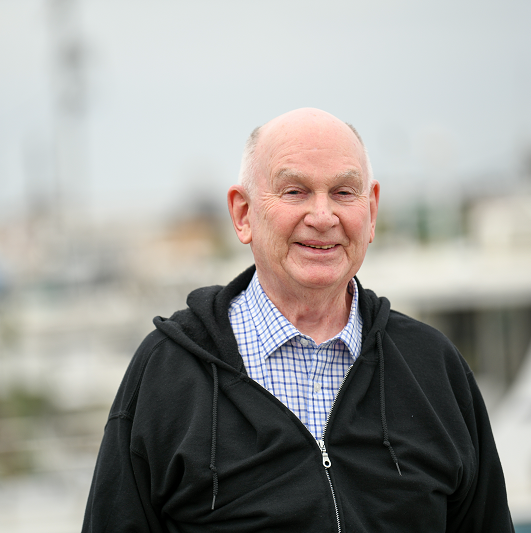

Jason Haviland was an active 48-year-old Basking Ridge, New Jersey resident, who went on a run one day in late 2019 when he felt something odd in his right thigh.
Thinking it was an injury, Jason went to his orthopedic doctor, who told him it was a torn hamstring. But the torn hamstring started worsening. His doctor then referred him to a soft tissue sarcoma surgeon, who ordered tests that confirmed a shocking diagnosis: Jason had cancer.
An Aggressive Form of Sarcoma
To confirm Jason’s specific type of sarcoma, his doctor ordered an MRI, which he had on January 8, 2020. Just five days later, he was diagnosed with a rare sarcoma called undifferentiated pleomorphic sarcoma (UPS). Jason's pea size nodule in his right thigh quickly started growing due to the aggressive nature of UPS.
Jason’s orthopedic oncologist at Jersey Shore University Medical Center, Francis Robert Patterson, M.D., referred him to Andrew Pecora, M.D., one of the world’s foremost experts in sarcoma cancers and cellular medicine at Hackensack University Medical Center’s John Theurer Cancer Center.
With Jason’s UPS being so aggressive and fast-growing, time was of the essence. He started chemotherapy on his 48th birthday, January 28, 2020.
Targeted Treatment for Sarcoma
Jason benefited from next-generation sequencing (NGS), a type of testing that determines the sequence of DNA and can help doctors target treatment. “Any patient with a large sarcoma, like Jason had, should have this testing done,” Dr. Pecora says.
He explains how NGS works:
- Cancer occurs when one or more genes in a cell change or mutate.
- When this happens, abnormal proteins are produced.
- NGS shows which genes have changed and which proteins that should not be there are being made.
- Doctors can better target treatments to turn off the products of the mutated cancer genes.
“With Jason, the NGS allowed us to see exactly what was driving the quick growth of his tumor and which specific proteins his tumor was making,” Dr. Pecora says. “Based on that knowledge, we knew that his tumor would be susceptible to Pazopanib, on oral medication that can slow tumor growth.”
Jason had a massive response to his targeted treatment. “With sarcoma, we are fortunate if we can achieve a 10, 20 or 30 percent tumor necrosis [cell death] through treatment,” Dr. Pecora says. “With Jason, Pazopanib allowed the radiation and chemotherapy to be so effective that it almost completely eliminated his tumor, with more than 95 percent tumor necrosis.”
After chemotherapy, radiation and Pazopanib concluded in April 2020, Jason underwent surgery in May 2020. Thanks to NGS, his surgery was much more limited and could preserve his leg function. The surgery removed all of the tumor mass (less than 5 percent residual viable cancer).
Jason appreciated the openness and honesty of his care team. “Dr. Paterson and Dr. Pecora were straightforward, but they cared and it showed,” he says. “They would show me the results from the CAT scans, and I could visibly see what was happening to the tumor, which kept motivating me to keep going through the treatment.”
Working on Getting Stronger
After recovering from surgery, in September 2020, Jason was able to begin physical therapy to regain strength in his right leg.
Before his diagnosis, Jason played soccer, ran and was incredibly active both outdoors and in the weight room. “I’m not where I was before my diagnosis, but I went running a few days ago,” Jason says. “I look forward to getting stronger again.”
Jason is grateful for his support team at home: his wife and three children. He appreciates his care team at the hospital: “The whole team, from my doctors to my nurses, was amazing. It wasn’t a fun journey, but the team and the connections made a massive difference,” he says.

Early Screening Helps South Amboy, NJ, Man Beat Prostate Cancer

‘Carpe Diem’ Rings True for Little Silver Cancer Survivor

Mother and Daughter Face Breast Cancer Diagnoses Together
